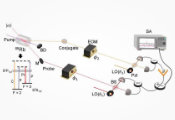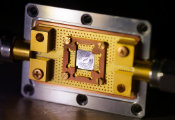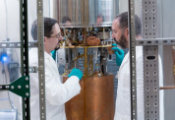Research Project at FAU’s Regional Computing Center Exploring Promising QKD Method
August 04, 2025 -- A new research project at Erlangen Regional Computing Center (RRZE) at Friedrich-Alexander-Universität Erlangen-Nürnberg (FAU) aims to encrypt data in practice using random quantum states without the risk of unauthorized tapping, thereby increasing the security of sensitive information. In view of the current geopolitical situation, data security is becoming increasingly important both for military communications and for international negotiations. Secrecy is key to preventing eavesdropping and any risk to negotiations.
Dr. Susanne Naegele-Jackson, head of the Network research group at the RRZE, and her two research associates Jasmin Neumann and Vincent Burkard are now researching an encryption procedure aimed at protecting communications in military and critical infrastructure in the project named “Integrating QKD technology into classical network settings.” In order to counteract the impending risk posed by quantum computers, the researchers aim to use not only the quantum key distribution (QKD) which is the object of research, but also post-quantum cryptography (PQC). PQC uses mathematical complexity, which is considered secure relative to the available computing power, to make data decryption harder, while QKD is based on physical principles and, when properly implemented, guarantees confidentiality in the future as well. “QKD relies on the unique properties of QuBits (usually photons) that differ from classical bits and that cause a change in state during measurement. They are therefore suitable for secure communications,” explains Jasmin Neumann. “In the current situation, research into quantum decryption is particularly important. Quantum computers are developing at breakneck speed and may in the near future be able to decode data that have previously been considered unbreakable. We always have to be one step ahead.”
In the first stage, planned to run until the end of 2026, the researchers will check the practicality of the systems. This includes investigating how the QuBits that are sensitive to light and temperature behave when used with classical network components. Once secure integration into the local network infrastructure has been achieved, research can be carried out into transferring them over longer distances using trusted nodes. At the current time, one of the greatest challenges is the secure exchange of keys over large distances. Without special quantum repeaters, individual photons can only travel up to a distance of 150 kilometers.
The researchers have purchased a research-oriented device pair from IDQ. The devices that are still located at the same location for test purposes should soon bridge a gap between campuses for enabling encrypted communications with the computers at the Erlangen National High-Performance Computing Center (NHR@FAU). This regional connection may also be extended, for instance to Munich.




































